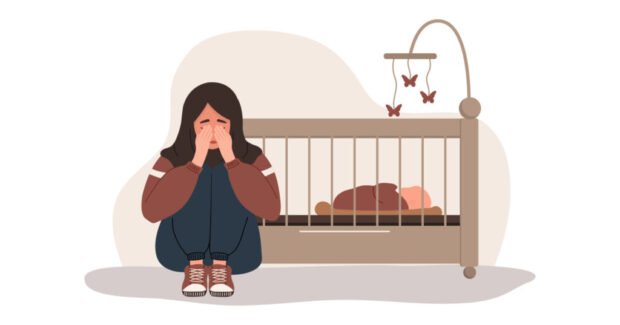After giving birth, you can have varying emotions, from excitement to fear or anxiety. Most mothers experience baby blues, which may include mood swings, crying spells, anxiety, and trouble sleeping. The baby blues can start two days after delivery and last two weeks. Some mothers may experience extreme emotions leading to postpartum depression. Howell postpartum depression is characterized by severe feelings like worthlessness, appetite loss, excessive crying, and persistent insomnia.
It can last for several months or years. You are at a higher risk of getting postpartum depression if you have a history of depression or experienced extreme stress during pregnancy.
Types of postpartum depression

Baby blues
Baby blues are the first mood disorder of postpartum depression. They affect about fifty to seventy-five percent of all mothers after childbirth. If you have baby blues, you may experience frequent bouts of crying without reason, sadness, and anxiety. Baby blues start one to four days of the first week after delivery and can last up to two weeks. If not treated, the condition subsides within two weeks. If you have baby blues, you can seek support from your partner, family, or friends.
Postpartum depression
Postpartum depression is more severe than baby blues. It affects about one in seven new mothers. Postpartum depression is characterized by frequent crying, irritability, fatigue, feeling unwell, anxiety, and inability to take care of yourself and your baby. There is a 30% chance that you will suffer postpartum depression if you had the condition during the previous pregnancy. Postpartum depression symptoms range from mild to severe.
The symptoms happen in the first week of childbirth and can last a year or more. Your doctor can effectively treat postpartum depression with psychotherapy or antidepressants.
Postpartum psychosis
Postpartum psychosis is a severe type of postpartum depression that requires immediate medical care. It is a rare condition affecting one in one-thousand mothers after delivery. Postpartum psychosis symptoms are severe and develop quickly after delivery, lasting for a few weeks to several months. Symptoms include extreme agitation, hopelessness, confusion, insomnia, paranoia, hallucinations, and hyperactivity. Postpartum psychosis increases the risks of suicide and harming your baby, so it requires urgent medical attention.
Treatment for postpartum depression

Medications
Doctors commonly use antidepressants to treat postpartum depression. They minimize most depression symptoms, but you may take six to eight weeks to see the outcomes. Sometimes you may have to use different antidepressants before discovering one that works for you. Anti-anxiety medicines can also help to relieve your symptoms.
Hormone therapy
Sometimes your postpartum depression can result from hormonal imbalance. After delivery, your estrogen and progesterone levels drop. Your doctor can recommend hormone therapy to balance your hormones, reducing postpartum depression symptoms.
Alternative therapies
Cognitive behavioral therapy can help reduce your postpartum depression symptoms. It helps change your thinking patterns and enhances confidence in your activities and abilities. Talk therapy with your therapist can help the provider know the cause of your emotions and develop an effective solution.
Mothers suffering from postpartum depression experience extreme emotions after giving birth. They may include frequent crying, anxiety, hopelessness, insomnia, and fatigue. Medications, cognitive behavior therapies, and hormone treatment can help treat postpartum depression. Schedule an appointment at ReYou Ketamine Treatments for postpartum depression treatment to enjoy a higher quality of life.




























